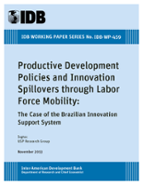Productive Development Policies and Innovation Spillovers through Labor Force Mobility: The Case of the Brazilian Innovation Support System
Date
Nov 2013
This paper focuses on two research problems. The first is to measure the direct impacts of innovation support measures in Brazil, and the second is to test the hypothesis of indirect effects of innovation policies on non-beneficiary firms through the labor mobility channel, whether resulting from direct support programs or indirect support via tax incentives. For this purpose, mobility is defined as the movement of workers in technical-scientific occupations, as identified by Araujo et al. (2009). It is found that, with the exception of a subvention program, direct support in the form of credit or cooperative projects fosters more innovative effort than tax incentives. Nonetheless, direct and tax- based incentives for innovation have different purposes, and sound innovation relies on both types of incentive.



